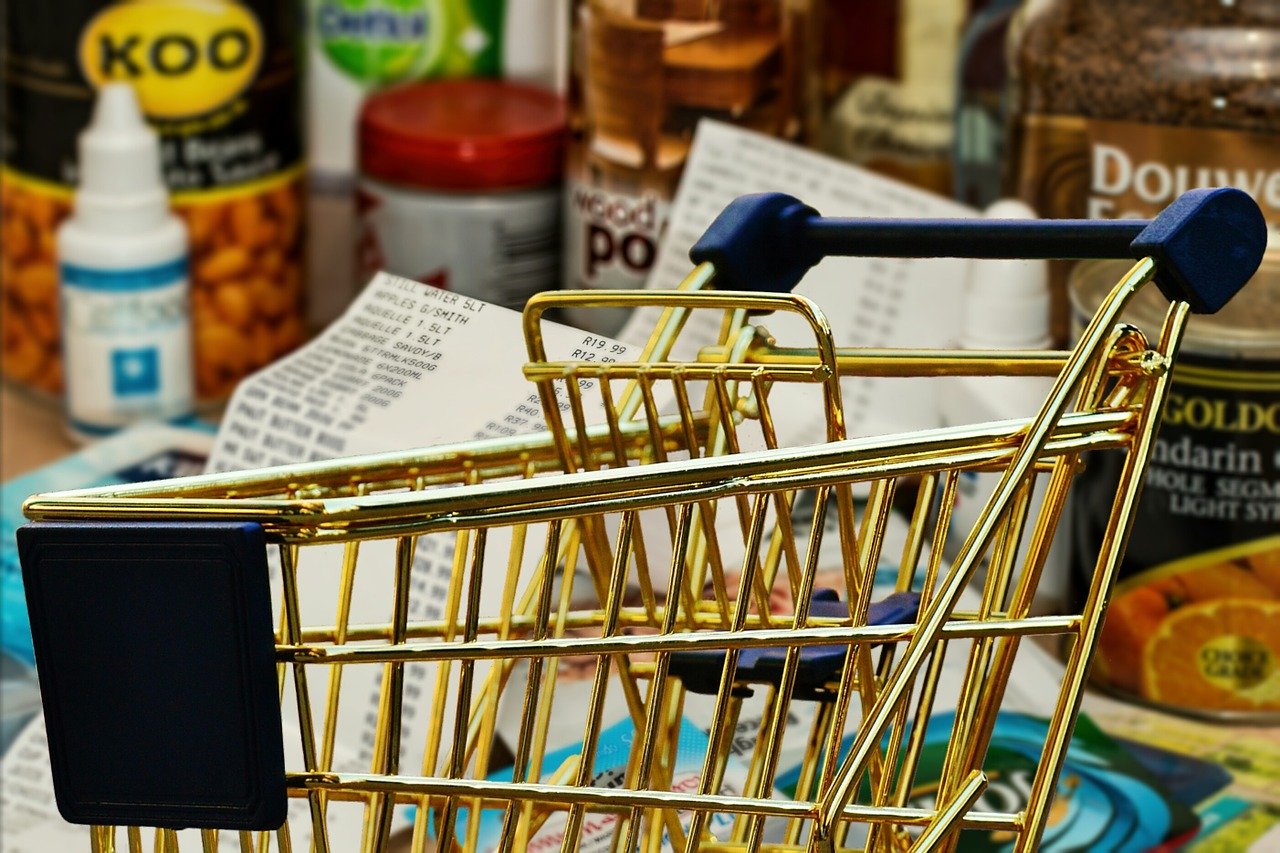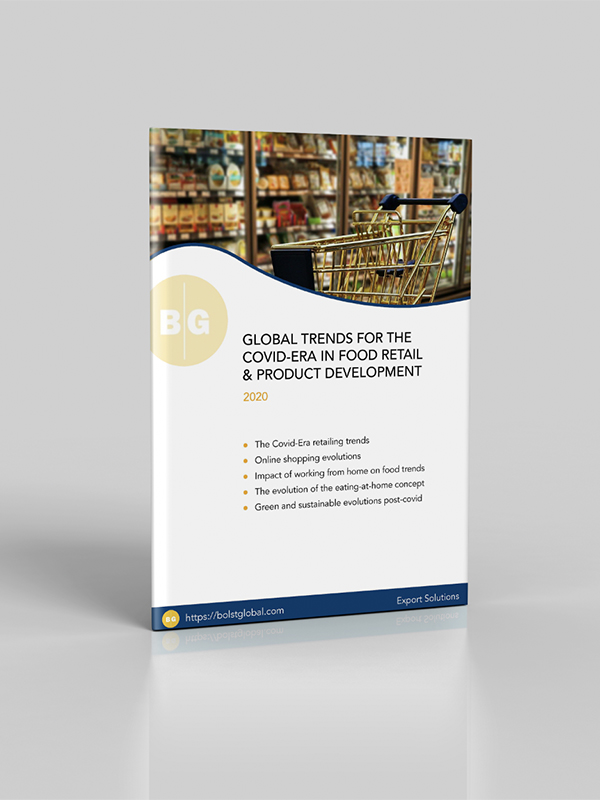Global Trends for the Covid-Era in Food Retail & Product Development
Global Trends for the Covid-Era in Food Retail & Product Development

It is important to monitor global trends more than ever for mutual learnings from other countries in these strange times with Covid-19 affecting all of us around the world.
Here at Bolst Global through our international contacts and expertise we have reviewed the major trends that we believe will help shape your retail and product development strategies.
1/ Hygienic, low contact & distanced shopping
The Clean Trolley machine was invented in the Netherlands to help sanitise supermarket trolleys for shopping safely. Retailers across Europe are trialling this car wash style cleaner which can be used individually by shoppers as a hole in the wall concept or can sanitise 30 trolleys at a time.

Another example of this is reducing contact by the increasing use of scan as you go payment systems British retailers have already been using, so the shoppers reduce check out queues and touch points as well as sensor controlled freezers doors. Rumour has it, German retailer Aldi is contemplating the use of traf c light queuing systems to help enforce social distancing in stores.
Online shopping has been a saviour during lockdown especially for those who are vulnerable. Carrefour UAE has been providing an impressive service with Groceries Delivered in 1 Hour to Your Door Step in Dubai & Abu Dhabi. We are also seeing global companies such as UberEats and Deliveroo now partnering with food retailers and corner shops to deliver grocery items.
Food boxes have also been used by many governments globally to send food to those at home and vulnerable; but many retailers around the world has also tapped into these opportunities. Could getting your products listed into these food boxes be as important as getting it listed on a shelf?
2/ Tapping into at home eating occasions
Breakfast and lunch options
With most of us working from home which may be a trend here to stay for some of us, there has been a challenge for on the go food categories in retail and out of home eating including lunch, coffee and snack purchases dipping to an all time low. There will be opportunities for manufacturers to offer ready to cook / bake lunch and breakfast alternatives such as oven ready breakfast pastries, quiches, and deli like snack items as well as hot lunch items. Healthier snacking at home is an area that is expected to grow further.
Frozen and ambient grocery is an area which has seen increase in demand so any new product opportunities in this sector will be an opportunity tap into this market, especially meal kits that create inspiration. Longer shelf life fresh products such as cured deli items are also winners.

Occasions at home
Having to celebrate special occasions such as Easter, Ramadan, Passover, birthdays, mother’s, and father’s days, even weddings at home there is an opportunity for special dining at home.
Even with the restaurants opening, the eating out experience may never be the same. Most of us are experimenting with cuisines led dining bringing the travelling and holiday to our homes. There is room for influencing consumers on luxury eating at home with premium products especially in indulgent categories such as international foods, desserts, restaurant quality meals as well as exciting table, dinner, garden and picnic ware and BBQ products.

Baking at home is also an opportunity for corona bakers who like to show case their skills on social media and to friends and family. There are some of us who are expert bakers as well as those who are learning how to bake, providing opportunity to offer niche foodie ingredients for scratch bakers as well as easy to use bakery and dessert kits.
There is also a demand for lockdown gifting and personal subscriptions using food hampers, luxury alcohol and snacking gifts as well as flower deliveries with most of us avoiding the shops but wanting to treat friends and family for special occasions. Could getting your premium artisanal and craft brands listed with such companies who offer the convenience to consumers help with brand recognition and value for your products?
3/ Protecting the Planet & Our Health
With more of us thinking of a greener recovery from Covid-19, it is up to every one of us to make this happen. With more consumers thinking less is more; manufacturers should explore some of the trends below to help consumers achieve these goals:


With Covid 19 affecting those who are overweight as well as diabetics, there has been an even growing importance for all of us to reduce nutrients of public health concern such as saturated fats, refined sugars, salt and excess intake of calories. Products that have a health bene t to help control these nutrients of concern and limit calorie intake will be popular with health-conscious shoppers.
Most of us wanting to protect our immune health; we could bene t in achieving our daily intake of immune supporting nutrients such as Vitamins A, B6 & B12, C, D, folic acid and minerals Zinc, Selenium, Iron. Eating more portions of fruit & vegetables also plays an important role as well as increasing resistant fibre from oats, fruit and vegetables, pre and pro biotics for gut health. Kefir and fermented food products such as Kimchi and Kombucha are ones to watch out, though more research is needed in their benefits. Do not forget fresh, frozen, canned, and pureed fruit and vegetables products all count towards your vegetable intake; and can be helpful with those consumers on a budget and looking for products with longer shelf life. Any meat, pasta or snack products that can utilise incorporating more fruit, vegetables and fibre into our diets have an opportunity to succeed.
Other areas of opportunity functional and fortified foods, supplements and herbal products are supporting sleep and mental health. Namely Magnesium, Pantothenic acid Omega 3 fatty acids help with such benefits, as well as those which can aid better sleep and relaxation such as Melatonin and St John’s Worth.
If there was one supplement that is worth investing on; it is Vitamin D. With most of us experiencing reduced access to sunlight while staying at home, we should all consider taking a 10microgram vitamin D supplement while the lockdown continues. Some studies conclude that vitamin D may increase resistance to common colds and u, particularly for people who have low vitamin D status, however currently there is not enough evidence that vitamin D can reduce the risk of coronavirus infection. Whilst more studies should be carried out in this area, it is widely known Vitamin D helps with immunity as well as supporting bone and muscle health.
This article was written by Nazli Wellington, a registered Nutritionist with over 10 year’s experience within FMCG including food supplements, sports nutrition, chilled meats and meal centres as well as food to go categories.

If you would like to download and keep a PDF copy of this report, please click the link below.
Contents
If you would like more information or export support, please complete the contact form below and one of our team will come back to you.



